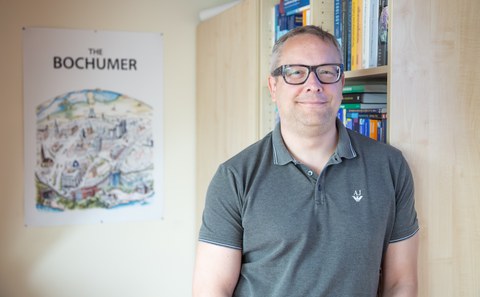Jan 22, 2024
Human action when faced with the “unknown unknown:” How the human brain handles new situations

Prof. Christian Beste, Child and Adolescent Psychiatry, TU Dresden
The Faculty of Medicine has launched a pioneering research project to investigate the “unknown unknown.” The focus is on deciphering how the human brain works in new and unprecedented situations. Past examples of such situations include the Chernobyl nuclear disaster or the outbreak of the coronavirus pandemic. The project not only strives for a deeper understanding of human behavior, but also opens up promising perspectives for future applications, such as how to better predict and regulate human action in unforeseen situations.
In a world that is constantly changing, we often encounter the unpredictable and the unknown. Researchers at University Hospital Dresden are exploring the phenomenon of the “unknown unknown” and how the human brain functions in completely new and uncharted situations. Making decisions in times of uncertainty is very common, and there is a behavioral repertoire that can be used to navigate the situation. The “unknown unknown” occurs when a situation is so new and unprecedented that previous experiences offer no guidelines for what course of action to take. People have clear goals in mind, but total uncertainty as to how these goals can be achieved leads to a form of disorientation. Previous scientific thoughts on how human behavior is controlled indicate that choosing a course of action in such situations is virtually impossible. However, this research consensus is in contradiction to reality, which shows that people are still capable of taking action despite their lack of experience.
This interdisciplinary research project combines innovative approaches from virtual reality (VR), electroencephalography (EEG), and brain stimulation techniques to decode the mechanisms of the human brain in completely unknown situations. The researchers want to understand how our brains manage to cope with such situations despite a lack of comparative experience.
Professor Christian Beste, Head of Cognitive Neurophysiology and Director of the University Neuropsychology Center (UNC), emphasizes the pioneering nature of this project, “There is as yet no theoretical basis to explain why people act the way they do in “unknown unknown” situations. The results could not only lead to a deeper understanding of human behavior, but could also lay the foundations for other scientific fields, such as artificial intelligence (AI). At the moment, AI is not really that intelligent because it essentially draws on existing solution repertoires. This is therefore not possible in ‘unknown unknown’ situations.”
The research results could signify a new level of conceptualization of human behavior and serve as a basis for application in various fields, including virtual reality. Better prediction of human behavior in unknown unknowns situations could also lead to greater confidence in dealing with health-related situations (cf. COVID-19 Pandemic).
The Dean of the Faculty of Medicine, Prof. Esther Troost, adds, “Our research typically transcends traditional boundaries – that is our aspiration, and the investigation into 'unknown unknowns' is a remarkable step into uncharted territories. This research approach not only promises a deeper understanding of human behavior, but also opens up new options for future applications in medicine.”
The project is funded by the Volkswagen Foundation as a high-risk project under the “Exploration” funding line. The funding program is open to outstanding researchers of all disciplines who have ideas for visionary projects based at research institutions and universities in Germany (Pioneering Research – Exploring the Unknown Unknown | VolkswagenStiftung).
Contact:
Professor Christian Beste
Child and Adolescent Psychiatry
Tel.: +49 (0)351 - 458 7072
About the Carl Gustav Carus Faculty of Medicine at TUD Dresden University of Technology
Dresden University Medicine, consisting of the Carl Gustav Carus Faculty of Medicine and the eponymous university hospital, specializes in research in the fields of oncology, metabolic as well as neurological and psychiatric diseases. Within these focal areas, the topics of degeneration and regeneration, imaging and technology development, immunology and inflammation, as well as prevention and health care research are of particular interest. Internationality is a prerequisite for top-level research – University Hospital Dresden embraces this concept with employees from 82 nations and numerous collaborations with researchers and teams from all over the world.
